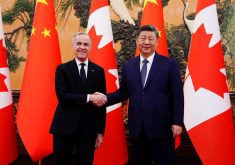A troubling trend is creeping up on global farmers as governments control food production and eliminate crop diversity.
In China, “non-grain” farming has become the target of the Rural Comprehensive Administrative Law Enforcement Brigade, or nongguan, which exercises agricultural administrative penalties and related inspections for the Agriculture and Rural Development ministries.
The areas that farmers are new to include no burying of the dead as this uses farmland, no fireworks, no burning of fields, waste or firewood. It is forbidden to plant fruits or vegetables in front of farm homes, and trees cannot be taken down that the farmer planted (but the government can remove all trees). It is against the law to sell any livestock or poultry privately just as it is to plant any plant other than government-promoted crops. In addition, farmers will be charged daily with a new rural tax.
Read Also

From MasterChef to ‘Barndominium’: Rootstock Ranch fires up the grill
Marianne Smeaton, from Charlie Lake, B.C., is opening an event centre with a menu featuring her homegrown Wagyu beef after appearing on MasterChef Canada’s finale.
All farmers now must pass a certification course and abide by the new policy. Everything a farmer owns is registered, including cats and dogs. The hours they work and what they do when not working in the field must be logged.
The idea behind the policy is to grow more food in monocultures. To support the initiative, the new Turning Forest into Farmland Policy will strip China of its ability to sequester carbon and host any form of biodiversity as the trees are destroyed. Even the cities will be impacted. The city of Chengdu is famous for the 100 km of park that surrounds it. The Communist party has ordered these areas destroyed and all ponds filled for the conversion to fields of wheat and corn.
The current crop is currently being destroyed, leaving farmers without this year’s income and forcing them into a monoculture where the profit is extremely thin compared to the fruits and vegetables and other non-government-promoted crops that were established.
China already loses 1.7 million acres of farmland per year through degradation, soil erosion, industry and industrial poisoning and urban reach. The current policies will not restore the land and will only increase soil loss and quality — potentially taking China away from the Party’s envisioned food security and back to poverty and hunger.
Throughout history, it has been proven that when we try to conquer the land and severely disrupt watersheds, challenging the biodiversity that makes critical events like pollination possible, the opposite of food availability occurs. China has already lived this in the 1950s and 1960s, through to the uprising which brought a recognition of farmers rights resulting in their access to land and the pull back of the farming tax in 2003.
Stepping back in time by enforcing certain crops resurfaces the old moral: if the country side starves, so does the city. Historically, it does not work to use military force to create a robust singular production system. A case in point is Indonesia where the Food Estate Program was started three years ago.
Enforced by the Ministry of Public Works and Housing, the Ministry of Agriculture and the Ministry of Defence, the idea was to create massive food estates of mega-rice projects. Over 900 forests have been cleared so far causing flooding and soil erosion. In addition to rice, farmers are told to plant corn, cassava, potato, garlic and shallots. An estate project in Papua will see 10,000 ha of corn planted on cleared land which is mostly peat — a practice that has failed in other areas of the nation.
While each ministry is now busy blaming the other for the failure of the food estates, the farmers’ voice has been silenced. Indonesia’s attempt at food sovereignty failed and inflation increased.
Food insecurity continues to rise globally and rural areas are under financial stress as the practice of clearing land for monocultures in the name of food security is proving economically crippling on other continents, including South America and Africa.
The blind push toward a monoculture and the consequential elimination of diversity is terminal and we do not know the forces behind these government decisions. Is this about hunger, war or power? Has globalization failed to this degree or is forced production in preparation for the interruption and dismemberment of global trade?
China and Indonesia may seem a world away but “we share the same earth and the same sky”. There is a real risk in the loss of seed diversity and farmer margins, and in an increase in the use of herbicides, pesticides and commercial fertilizer. We don’t have the privilege of time to watch soil rebuild itself nor can we continue to pressure Canadian farmers to sequester for the mistakes of other nations.
In Canada we have the democratic right to be involved in shaping policy and in saying “no thanks” when it is not in the best interest of the future of agriculture. Canadian farmers can take charge in being the the world leaders in a healthy and diverse landscape that incorporates all of the possible in food production systems that are complimentary to the well being of our society.
















